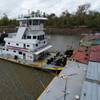USCG Preps for July 1 Security Deadline
A new international code and U.S. law requires vessels and facilities implement security measures designed to protect the world's global shipping industry from terrorist attacks. The International Ship and Port Facility Security Code and the Maritime Transportation Security Act require ports and vessels to control access, monitor activity, and screen personnel, baggage, cargo, and vehicles.
Under the U.S. law and the international code, port facilities and vessels must implement the new security measures by July 1. Some of the key milestones leading up to this deadline include:
* Security plans received from 99 percent of required U.S. vessels and facilities
* Alternative Security Programs used by two-thirds of the vessels that submitted plans
* Initial reviews completed on most facility and vessel plans
* Area Maritime Security Committees established in all U.S. port areas
The Coast Guard is also preparing to verify international compliance with the new requirements by:
* Boarding every vessel, at sea or at the dock, on its first visit to a U.S. port on or after July 1;
* Taking additional security precautions or denying entry into U.S. waters for non-compliant vessels on a case by case basis;
* Tracking vessels coming from non-compliant ports. Those vessels may be subject to delays until their security status can be verified through a Coast Guard boarding;
* Visiting countries to evaluate antiterrorism measures in their ports with the host nation and;
* Exchanging information with and providing training to foreign countries to assist with interpretation and implementation of the international code.














